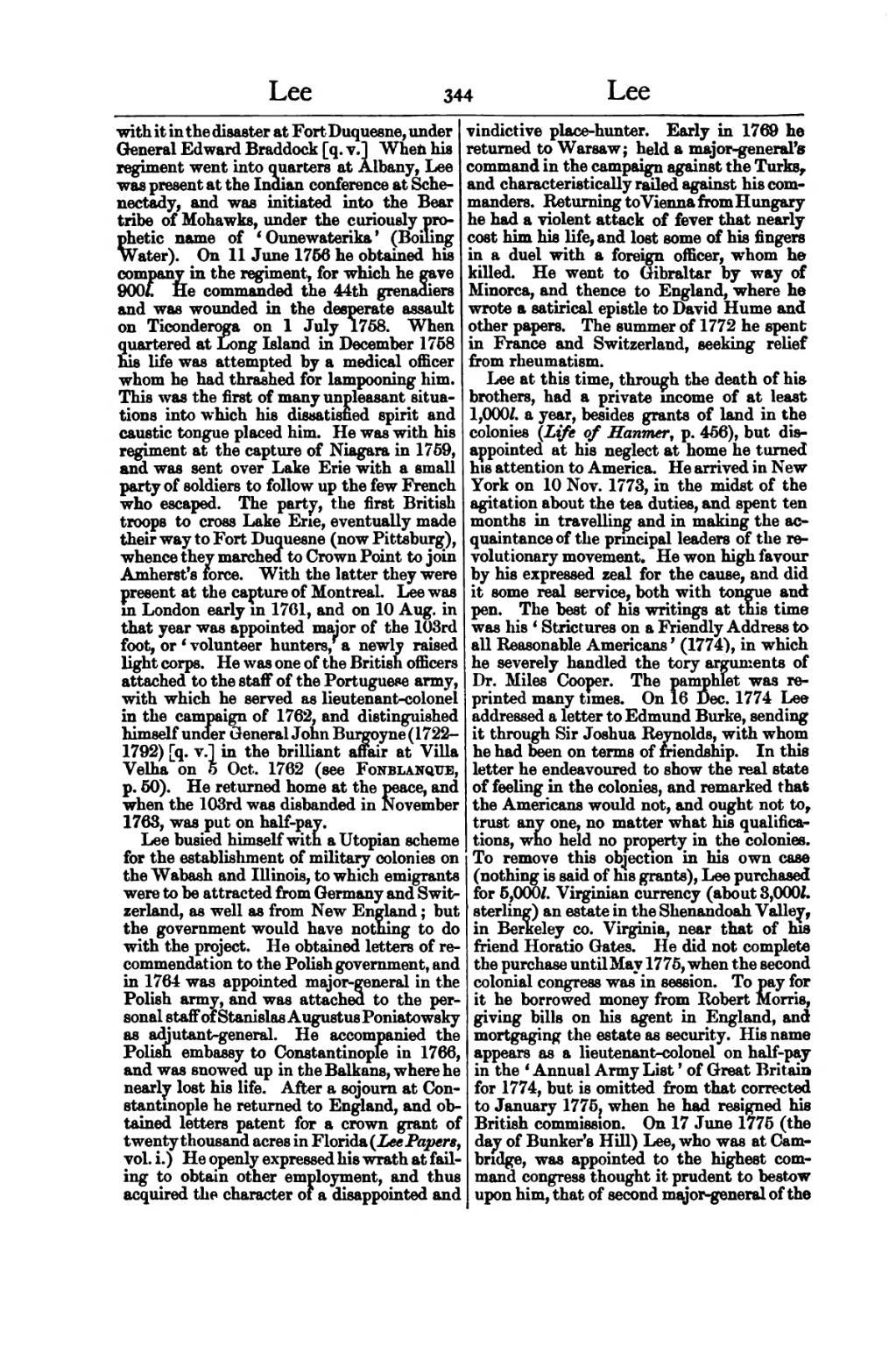with it in the disaster at Fort Duquesne, under
General Edward Braddock [q. v.] When his
regiment went into quarters at Albany, Lee
was present at the Indian conference at Schenectady, and was initiated into the Bear tribe of Mohawks, under the curiously prophetic name of 'Ounewaterika' (Soiling
Water). On 11 June 1756 he obtained his company in the regiment, for which he gave 900l. He commanded the 44th grenadiers and was wounded in the desperate assault
on Ticonderoga on 1 July 1758. When
quartered at Long Island in December 1758
his life was attempted by a medical officer
whom he had thrashed for lampooning him.
This was the first of many unpleasant situations into which his dissatisfied spirit and caustic tongue placed him. He was with his
regiment at the capture of Niagara in 1759,
and was sent over Lake Erie with a small
party of soldiers to follow up the few French
who escaped. The party, the first British
troops to cross Lake Erie, eventually made
their way to Fort Duquesne (now Pittsburg),
whence they marched to Crown Point to join
Amherst's force. With the latter they were
present at the capture of Montreal. Lee was
in London early in 1761, and on 10 Aug. in
that year was appointed major of the 103rd
foot, or 'volunteer hunters, a newly raised light corps. He was one of the British officers
attached to the staff of the Portuguese army,
with which he served as lieutenant-colonel
in the campaign of 1762, and distinguished
himself under General John Burgoyne (1722-1792) [q. v.] in the brilliant affair at Villa Velha on 5 Oct. 1762 (see Fonblanque, p. 60). He returned home at the peace, and when the 103rd was disbanded in November 1763, was put on half-pav.
Lee busied himself with a Utopian scheme for the establishment of military colonies on the Wabash and Illinois, to which emigrants were to be attracted from Germany and Switzerland, as well as from New England ; but the government would have nothing to do with the project. He obtained letters of recommendation to the Polish government, and in 1764 was appointed major-general in the Polish army, and was attached to the personal staff of Stanislas Augustus Poniatowsky as adjutant-general. He accompanied the Polish embassy to Constantinople in 1766, and was snowed up in the Balkans, where he nearly lost his life. After a sojourn at Constantinople he returned to England, and obtained letters patent for a crown grant of twenty thousand acres in Florida (Lee Papers, vol. i.) He openly expressed his wrath at failing to obtain other employment, and thus acquired the character of a disappointed and vindictive place-hunter. Early in 1769 he returned to Warsaw; held a major-general's command in the campaign against the Turks, and characteristically railed against his commanders. Returning to Vienna from Hungary he had a violent attack of fever that nearly cost him his life, and lost some of his fingers in a duel with a foreign officer, whom he killed. He went to Gibraltar by way of Minorca, and thence to England, where he wrote a satirical epistle to David Hume and other papers. The summer of 1772 he spent in France and Switzerland, seeking relief from rheumatism.
Lee at this time, through the death of his brothers, had a private income of at least 1,000l. a year, besides grants of land in the colonies (Life of Hanmer, p. 466), but disappointed at his neglect at home he turned his attention to America. He arrived in New York on 10 Nov. 1773, in the midst of the agitation about the tea duties, and spent ten months in travelling and in making the acquaintance of the principal leaders of the revolutionary movement. He won high favour by his expressed zeal for the cause, and did it some real service, both with tongue and pen. The best of his writings at this time was his 'Strictures on a Friendly Address to all Reasonable Americans' (1774), in which he severely handled the tory arguments of Dr. Miles Cooper. The pamphlet was reprinted many times. On 16 Dec. 1774 Lee addressed a letter to Edmund Burke, sending it through Sir Joshua Reynolds, with whom he had been on terms of friendship. In this letter he endeavoured to show the real state of feeling in the colonies, and remarked that the Americans would not, and ought not to, trust any one, no matter what his qualifications, who held no property in the colonies. To remove this objection in his own case (nothing is said of his grants), Lee purchased for 5,000l. Virginian currency (about 3,000l. sterling) an estate in the Shenandoah Valley, in Berkeley co. Virginia, near that of his friend Horatio Gates. He did not complete the purchase until May 1775, when the second colonial congress was in session. To pay for it he borrowed money from Robert Morris, giving bills on his agent in England, and mortgaging the estate as security. His name appears as a lieutenant-colonel on half-pay in the 'Annual Army List' of Great Britain for 1774, but is omitted from that corrected to January 1775, when he had resigned his British commission. On 17 June 1775 (the day of Bunker's Hill) Lee, who was at Cambridge, was appointed to the highest command congress thought it prudent to bestow upon him, that of second major-general of the
